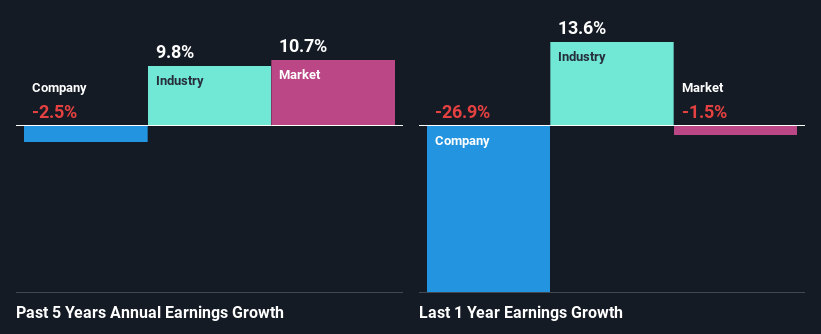Venture's (SGX:V03) share price has risen 2.8% over the past three months. However, we decided to focus on the company's weak financial position in this article, as long-term fundamentals will ultimately determine market outcomes. In particular, we will be looking at Venture's ROE today.
Return on equity (ROE) is a key factor to consider for a shareholder because it tells them how effectively their capital is being reinvested – in other words, how successful a company is in converting shareholder investments into profits.
Check out our latest analysis for Venture
How to Calculate Return on Equity?
Return on equity can be calculated using the following formula:
Return on Equity = Net Income (from continuing operations) / Shareholders' Equity
So, based on the above formula, the venture's ROE is:
9.5% = S$271m ÷ S$2.8b (Based on the trailing twelve months to December 2023).
The “return” is the profit after tax over the trailing 12 months, i.e. for every S$1 of shareholders' capital, the company generated S$0.10 in profit.
What is the relationship between ROE and profit growth?
Thus far, we've learned that ROE is a measure of a company's profitability. Depending on how much a company reinvests or “retains” these profits, and how effectively it does so, we are able to assess a company's earnings growth potential. Generally speaking, all else being equal, companies with higher return on equity and retained profits will have higher growth rates than companies that don't share these attributes.
Venture revenue growth and 9.5% ROE
At first glance, Venture's ROE doesn't look all that attractive. However, we don't write the company off completely, as its ROE is on par with the industry average of 11%. That being said, Venture's five-year net income decline was 2.5%. Remember that the company's ROE was a bit low to begin with, which may explain the shrinking revenue growth.
That being said, we compared Venture's performance to the industry and were concerned to see that the company's revenues have been shrinking while the industry has seen revenues grow at 9.8% over the same five-year period.


Earnings growth is a big driver of stock valuation. What investors need to determine next is whether the expected earnings growth, or lack thereof, is already priced into the stock price. Doing so will help them determine if the stock's future is promising or ominous. What is V03 currently worth? The intrinsic value infographic in our free research report helps visualize whether V03 is currently undervalued by the market.
Are venture companies making effective use of their profits?
With a high three-year median dividend payout ratio of 70% (i.e. 30% of profits are retained), most of the venture's profits are paid out to shareholders, which contributes to the company's declining revenues, leaving only a small amount of capital to reinvest, creating a vicious cycle that is not profitable for the company in the long run.
Additionally, Venture has been paying dividends for at least 10 years, meaning the company's management is determined to pay dividends even in the presence of little to no earnings growth. Based on the latest analyst forecasts, the company's dividend payout ratio over the next three years is expected to remain stable at 72%. As a result, Venture's ROE is also not expected to change much, which is inferred from analysts' future ROE forecasts of 11%.
Conclusion
Overall, we would think twice before deciding on any investment action regarding the venture. The company is retaining very little of its profits, which is slowing its revenue growth and what little profits it does retain are being reinvested at very low rates of return. That being said, according to the latest industry analyst forecasts, analysts expect the company's revenue growth rate to improve significantly. To know more about the latest analyst forecasts for the company, check out our visualization of analyst forecasts for the company.
Have feedback about this article? Concerns about the content? contact Please contact us directly. Or email editorial-team (at) simplywallst.com.
This article by Simply Wall St is general in nature. We use only unbiased methodologies to provide commentary based on historical data and analyst forecasts, and our articles are not intended as financial advice. It is not a recommendation to buy or sell stocks, and does not take into account your objectives, or your financial situation. We seek to provide long-term focused analysis driven by fundamental data. Note that our analysis may not take into account the latest price sensitive company announcements or qualitative material. Simply Wall St has no position in any of the stocks mentioned.


